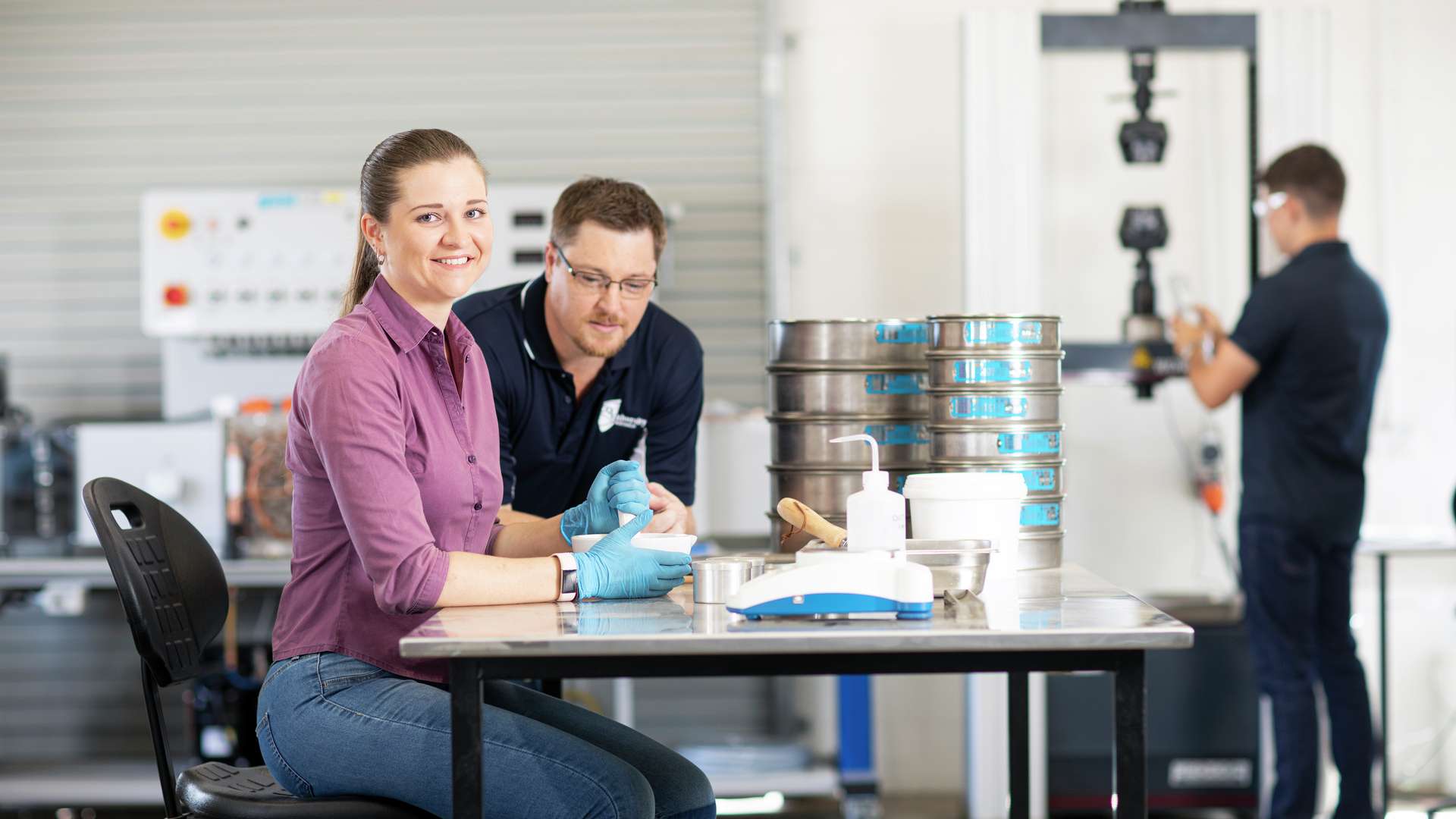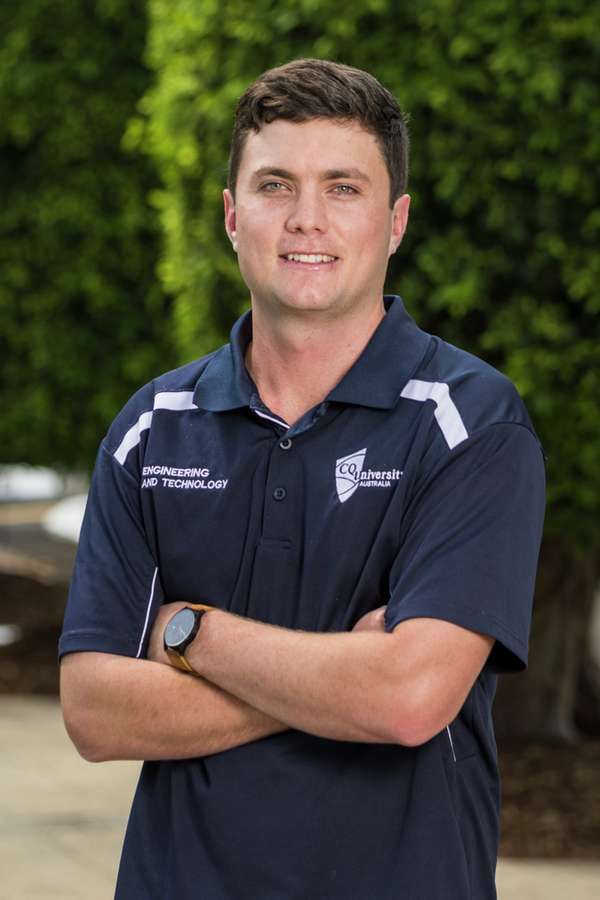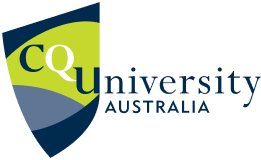| Rank threshold | ATAR: 69 SR: 69 |
| Duration | 4 years full-time, 8 years part-time |
| Location | Online and |
| Next start term | Term 2, 2024 |
| Study mode | On Campus, Online |
| Course code | CC31 |
| First-year fee | $8,382 (Indicative) (CSP) |

Overview
Prepare for a diverse career with possibilities to work as a professional Engineer across various industries, locally, nationally and internationally, with CQUniversity's Bachelor of Engineering (Honours). You will have the choice to major in traditional engineering disciplines and dual major options that will prepare you for emerging specialist fields of engineering, including civil with humanitarian engineering, electrical with information processing, and electrical with data analytics.
The Bachelor of Engineering (Honours) develops your problem-solving, teamwork and communication skills and incorporates project-based learning so you can graduate work-ready.
The first year of your studies provides a general understanding of engineering, allowing you to experience each different engineering area before you choose a particular path to follow. Later in your studies, you have the flexibility to choose to study Civil, Civil with Humanitarian, Electrical, Electrical with Data Analytics, Electrical with Information Processing, Mechanical, Mechatronic or Resource Systems Engineering.
One of the benefits of studying engineering at CQUniversity is our strong relationships with industry practitioners that offer support through scholarships, guest lectures and work-integrated learning.
Study the Bachelor of Engineering (Honours) either full-time or part-time and on-campus or online. You may choose to study by online study while working in engineering, allowing you to earn and gain practical experience while you learn.
Study experience
- Authentic Learning Experiences
- Industry Relevant
- Internships
- Work-integrated Learning
 “
“The course is very interesting. You get to see a wide range of the whole industry as a whole. All the sort of equipment is state of the art, so it's really interesting and easy to work with.
Rhett Lamperd
Bachelor of Engineering (Honours) (Electrical)
Career Opportunities
The Bachelor of Engineering (Honours) is your gateway to various engineering roles. Upon completion of the course, you will be qualified to work as a professional Engineer in the Civil, Electrical, Mechanical, Mechatronic or Resource Engineering fields, depending on your chosen major.
Structure & Availability
Course structure
You are required to complete seven core units and a 21- or 22-unit major in either:
- Civil (21 units)
- Civil with Humanitarian (21 units)
- Electrical (21 units)
- Electrical with Data Analytics (21 units)
- Electrical with Industrial Automation (21 units)
- Electrical with Information Processing (21 units)
- Mechanical (22 units)
- Mechanical with Industrial Automation (21 units)
- Resource Systems (22 units)
Unit information
For information on the units you could study as part of this course, visit the Handbook and select the "Course Structure" tab.
Credit transfer information
If you have already completed study relevant to the course you have enrolled in, you may be eligible for credit transfer.
Mathematics credit option
If you have completed Mathematical Methods in Year 12, you may receive credit for the Foundation Mathematics (MATH11247) unit, which sits in the electrical, mechanical, and civil majors. Please email the College of Engineering and Aviation to learn about how to apply for the mathematics credit pathway.
On-Campus Availability
| Intake | Locations |
|---|---|
| Term 1, 2023 | Bundaberg, Cairns, Gladstone, Mackay, Rockhampton |
| Term 2, 2023 | Bundaberg, Cairns, Gladstone, Mackay, Rockhampton |
| Term 1, 2024 | Bundaberg, Cairns, Gladstone, Mackay, Rockhampton |
| Term 2, 2024 | Bundaberg, Cairns, Gladstone, Mackay, Rockhampton |
| Term 1, 2025 | Bundaberg, Cairns, Gladstone, Mackay, Rockhampton |
| Term 2, 2025 | Bundaberg, Cairns, Gladstone, Mackay, Rockhampton |
Online Availability
| Intake | Locations |
|---|---|
| Term 1, 2023 | Available Online |
| Term 2, 2023 | Available Online |
| Term 1, 2024 | Available Online |
| Term 2, 2024 | Available Online |
| Term 1, 2025 | Available Online |
| Term 2, 2025 | Available Online |
Civil major
You will learn about planning design, and maintenance of physical infrastructure systems such as buildings and bridges, harbours and railways. Plus, you'll grow your knowledge and skills in hydraulics and materials science.
Civil with Humanitarian major
This discipline allows you to be involved in the planning design and maintenance of physical infrastructure systems in underprivileged communities and disaster-prone areas.
Electrical "You will learn about analogue and digital electronics foundations, AC and DC circuit configurations, development and maintenance of controls technology, electrical engineering concepts, communications systems, and materials sciences.
Electrical with Data Analytics major
This major will provide you with specialist skills in computer programming within the field of electrical engineering.
Electrical with Industrial Automation major *
This major is an ideal option if you have an interest in the growing electrical automation field. You will develop skills in designing, implementing, analysing and maintaining complex industrial control systems and instrumentation using industry-standard software and hardware tools.
Electrical with Information Processing major
This major is an ideal option if you have an interest in specialist fields of electrical engineering involving analysing system data to monitor and control electrical engineering systems.
Mechanical major
You will build skills and knowledge in planning, design, installation, maintenance and operation of machines, thermodynamic and combustion systems, fluid systems, materials handling systems, manufacturing equipment and process plant.
Mechanical with Industrial Automation major *
Develop skills to design mechanical control systems incorporating automation with a strong focus on thermodynamics and heat transfer principles. Plus, you’ll build knowledge on material design, stress analysis and machine design to meet industry standards and codes.
Resource Systems major
Designed to meet the industry need of traditional mine sites to transition to automated sites and increase productivity. This major focuses on the interpretation of data to assess the feasibility of a variety of resource projects within the legislation.
* major available from Term 1, 2024
Professional Practice - Engineers Australia
Electrical and Information Processing Major, Civil and Humanitarian Major, Resource Systems Major, Mechatronics Major, Mechanical Major, Electrical Major, Civil Major
The CC31 Bachelor of Engineering (Honours) course is fully accredited* by Engineers Australia.
Graduates are recognised as professional engineers and are eligible for Graduate membership with EA.
*The following recently introduced majors have provisional accreditation until there are sufficient graduates for them to be reviewed by EA:
- Electrical with Data Analytics
- Electrical with Information Processing
- Resource Systems
- Civil with Humanitarian
Professional Practice - Engineers Australia
Electrical and Data Analytics Major
The CC31 Bachelor of Engineering (Honours) course is fully accredited* by Engineers Australia.
Graduates are recognised as professional engineers and are eligible for Graduate membership with EA.
*The following recently introduced majors have provisional accreditation until there are sufficient graduates for them to be reviewed by EA:
- Electrical with Data Analytics
- Electrical with Information Processing
- Resource Systems
- Civil with Humanitarian
Engineering Practice Experience - ENEP14004
Students are required to complete 480 hours (including a minimum of 240 hours of industry experience) of Engineering Professional Practice prior to graduation. Once the students have completed the professional practice requirements, they must enrol in this unit and provide evidence of how they have attained the professional engineering practice exposure required by Engineers Australia.
Requirements
To be eligible
For your application to be considered, you must meet the following entry requirements.
Student and Course Profiles
View the student and course profiles for this course and learn about CQU's Undergraduate Profile for Term 1, 2023 via our Institute Profile.
During your study
While not needed to apply, you'll need to meet the following requirements throughout your studies.
Fees & Scholarships
Indicative First-Year Fee
The Indicative First-Year Fee is the approximate cost of enrolling in this course for one full-time academic year (eight units over two terms) for a Commonwealth Supported Place (CSP). Your actual fees may vary, depending on the units you select to study and your study load. Fees are reviewed each year and are subject to change. Understanding your fees.
Commonwealth Supported Places
This course has Commonwealth Supported Places (CSPs) available, and as a domestic student, you'll be offered a CSP, provided you meet CSP eligibility requirements. CSPs are subsidised by the Australian Government, meaning you are only required to pay the student contribution rather than full tuition fees.
HECS-HELP Loan
You may be eligible for a HECS-HELP government loan if you are offered a CSP. HECS-HELP is an Australian Government loan scheme that assists you in paying your student contributions. Provided you meet the HECS-HELP eligibility criteria, you may use HECS-HELP to defer part or all of your student contribution fees.
Part of your course costs will include Student Services and Amenities Fees (SSAF). SSAF is charged in addition to your student contribution or tuition fees and is used to help enhance your study experience. There may also be other costs as part of your studies, such as textbooks, technology expenses, travel expenses, professional certifications, uniforms, or vaccinations. Explore other study costs.
We believe a quality education can be for everyone – regardless of background, location, or life circumstances. That's why we offer a variety of scholarships and bursaries that can give you a helping hand with a range of expenses and enhance your employability.
How to apply
How to apply
Check what you need to do to apply to study this course.
Your application options
Follow these steps
Extra admission information
Prior to applying, take a look at important application dates and learn about our admission considerations, such as information for domestic students with overseas qualifications, indigenous support, and elite athlete, coach and performer support. You should also check out the adjustment schemes that might be available to you and how to access them. You can also explore our offer information to learn more about what happens after you've submitted an application and how to respond to an offer to study with CQU.
Start your application
When applying through a tertiary admissions centre (TAC) you can use the relevant TAC code below to search for a course or add it to your application preferences.


